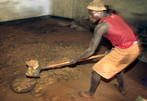
From the sound of some rather alarmist recent headlines, one might get the impression that Enough is calling for a boycott of Congolese minerals, which will put miners out of work and create a humanitarian catastrophe in eastern Congo. We are not calling for such a boycott, as explained in our frequently asked questions about conflict minerals.
Consumer pressure on corporations to ensure that they are not purchasing minerals from armed groups is a critical pressure point that can improve conditions on the ground for Congolese civilians who continue to be targeted by armed groups on all sides of the conflict. Human Rights Watch has just documented the raping of 90 women and girls in eastern Congo by the rebel groups and Congolese soldiers on looting sprees. In recent weeks, the FDLR, the rebel group linked to the 1994 genocide in Rwanda, has been systematically killing and raping civilians in the Lubero territory of North Kivu, the location of valuable gold mines. The Congolese army and its recently integrated former rebel allies are also massing for operations against the FDLR near Kahuzi-Biega park on the border between North and South Kivu, near the location of rebel-controlled mining areas. The U.N. Group of Experts has documented the sale of minerals controlled by the FDLR to major international smelting companies such as the Thailand Smelting and Refining Company. Personally, I would like to be certain that such minerals do not wind up in my computer or cell phone. Wouldn’t you?
But corporate pressure is just one component of a far more comprehensive approach to the conflict minerals issue which should include security sector reform, radical action to improve the governance of the trade in Congo, and revitalized efforts to improve livelihoods for civilians in eastern Congo, including alternatives to artisanal mining. We need to pay careful attention to mitigate short-term economic shocks to Congolese communities, but unless we make a conscious effort to cut off funding for human rights abusers, we are acquiescing to a status quo where our purchases are funding their atrocities.

